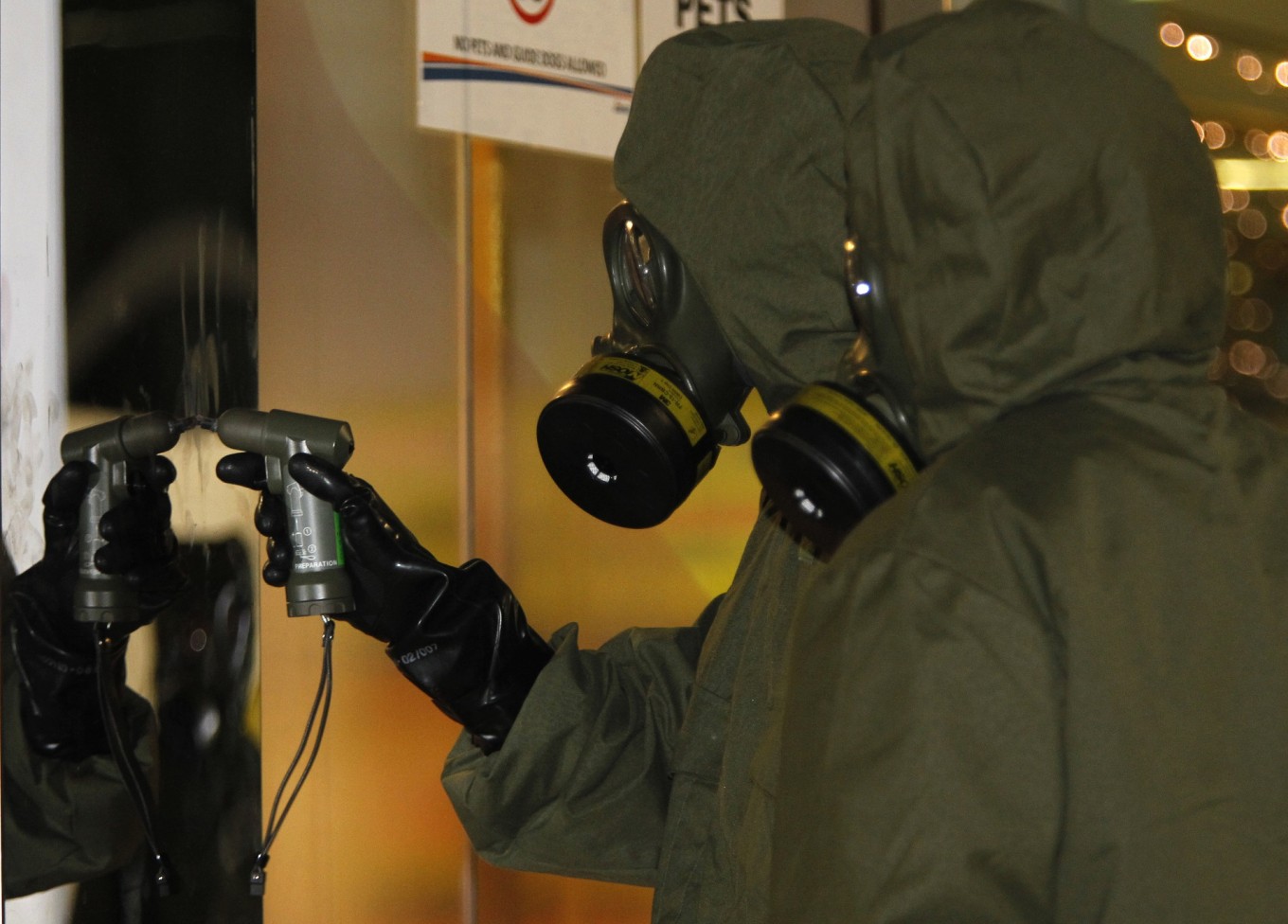Popular Reads
Top Results
Can't find what you're looking for?
View all search resultsPopular Reads
Top Results
Can't find what you're looking for?
View all search resultsKim Jong Nam died within 20 minutes of poisoning: Malaysia
Change text size
Gift Premium Articles
to Anyone
 Seeking clues: A Hazmat crew checks a stain on the wall at Kuala Lumpur International Airport 2 in Sepang, Malaysia on Sunday. Malaysian police order a sweep of Kuala Lumpur airport for toxic chemicals and other hazardous substances following the killing of Kim Jong Nam. (AP Photo/Daniel Chan) (AP/Daniel Chan)
Seeking clues: A Hazmat crew checks a stain on the wall at Kuala Lumpur International Airport 2 in Sepang, Malaysia on Sunday. Malaysian police order a sweep of Kuala Lumpur airport for toxic chemicals and other hazardous substances following the killing of Kim Jong Nam. (AP Photo/Daniel Chan) (AP/Daniel Chan)
Malaysia's health minister said Sunday that the dose of nerve agent given to North Korean ruler Kim Jong Un's half brother was so high that it killed him "within 15-20 minutes."
Kim Jong Nam died Feb. 13 at Kuala Lumpur's airport in what Malaysian police say was a well-planned hit by two women who wiped a liquid on Kim's face. Police revealed Friday that the banned chemical weapon VX nerve agent was used to kill Kim, raising the stakes significantly in the case.
Health Minister Subramaniam Sathasivam said the dose of VX given to Kim was so high that he showed symptoms within minutes. Kim fainted at the airport clinic and subsequently died in the ambulance while en route to a hospital, he said.
Hospital doctors suspected from the start that Kim had been given a form of toxic chemical agent due to the rapid symptoms, Subramaniam said.
"VX only requires 10 milligrams to be absorbed into the system to be lethal, so I presume that the amount of dose that went in is more than that," he told a news conference. "The doses were so high and it did it so fast and all over the body so it would have affected his heart, it would have affected his lungs, it would have affected everything."
Asked how long it took for Kim to die after he was attacked, Subramaniam said, "I would think it was about from the time of onset (of attack) ... within 15-20 minutes."
Experts say the nerve agent used to kill Kim was almost certainly produced in a sophisticated state weapons laboratory and is banned under an international treaty. But North Korea never signed the treaty, and it has spent decades developing a complex chemical weapons program.
Kim was not an obvious political threat to his estranged half brother, Kim Jong Un. But he may have been seen as a potential rival in North Korea's dynastic dictatorship, even though he had lived in exile for years. North Korea has denied any role in the attack.
(Read also: Malaysia to check airport for toxic chemical)
Earlier Sunday, Subramaniam said the state chemistry department's finding of the VX toxin confirmed the hospital's autopsy result that suggested a "chemical agent caused very serious paralysis" that led to death "in a very short period of time." The VX agent can lead to death very quickly in high doses, he said.
He said the final autopsy report would be submitted to police soon.
Subramaniam also said there have been no reports of anyone else being sickened by the toxin, but he said medical workers who attended to Kim would be under observation for possible delayed effects.
Tens of thousands of passengers have passed through the airport since the apparent assassination was carried out. No areas were cordoned off and protective measures were not taken.
Early Sunday, more than a dozen officers in protective gear swept the budget terminal where Kim was attacked and said they found no traces of VX.
Abdul Samah Mat, the police official leading the investigations, said the terminal is "free from any form of contamination of hazardous material" and declared it a "safe zone" after a two-hour sweep.
Malaysia hasn't directly accused the North Korean government of being behind the attack, but officials have said four North Korean men provided two women with poison to carry it out. The four men fled Malaysia on the same day as the killing, while the women — one from Indonesia and the other Vietnamese — were arrested.
Abdul Samah said the Indonesian woman, Siti Aisyah, vomited in a taxi on the way from the airport after the attack but was fine now. He said that more tests were needed to determine if the two arrested suspects were given antidotes so the nerve agent wouldn't kill them.
He also said a condominium on the outskirts of Kuala Lumpur that was raided by police last week was rented by the four North Korean suspects who had left the country. He said police were still testing a seized substance for traces of any chemicals.
Police have also said they wanted to question Hyon Kwang Song, a second secretary at the North Korean Embassy in Kuala Lumpur. Abdul Samah said Saturday that authorities would give the diplomat reasonable time to come forward, but would seek an arrest warrant from the court if he failed to do so.
Lawyer Sankara Nair however, noted that diplomats have immunity privileges even in criminal cases.
On Saturday, representatives from the Indonesian and Vietnamese embassies met with the two arrested women, who both said they thought they were part of a prank show.
In grainy surveillance footage from the day of the attack, the women appear to smear something onto Kim's face before walking away in separate directions. Malaysian police said the attackers knew what they were doing and had been trained to go immediately to the bathroom and clean their hands.
An antidote, atropine, can be injected after exposure and is carried by medics in war zones where weapons of mass destruction are suspected.






